Nearly 90 percent of the public identify themselves as Taiwanese and about two-thirds said they are willing to fight for the country in case of war, a survey released yesterday by the Taiwan New Constitution Foundation showed.
The question about national identity showed that 89.9 percent identify themselves as Taiwanese and 4.6 percent as Chinese, while 1 percent consider themselves to be both, the poll showed.
Given more than one choice, 67.9 percent of respondents said they are Taiwanese, 1.8 percent said they are Chinese and 27.9 percent said they are both, the survey showed.

Photo: Chen Yu-fu, Taipei Times
The survey also showed that 36 percent of respondents said they would absolutely go to war to defend Taiwan, while 28.3 percent said they probably would, 12.7 percent said they would not and 7.4 percent had no opinion.
Asked about Taiwan’s future, 50.1 percent of the public support maintaining the “status quo,” 38.9 percent back independence and 4.7 percent favor joining China.
Asked about their perceptions about other countries, Japan received the most positive view with 83.9 percent, followed by the US with 75.6 percent.
In contrast, the majority, or 70.3 percent, have a negative view of China, while only 16.4 percent have a positive view of Taiwan’s neighbor across the Strait.
Asked about the recently concluded Tokyo Olympics, 65.1 percent of respondents said they referred to the country’s Olympic delegation as “Taiwan” in conversation, while 27.6 percent said they called it “Chinese Taipei” or “Zhonghua” (中華), the poll showed.
More than 82 percent said they regretted that the country took part in the Tokyo Olympics under the name “Chinese Taipei,” and that the national flag and anthem could not be displayed during the Games, it said.
Foundation chairman and founder Koo Kwang-ming (辜寬敏), 94, said he has supported Taiwan’s normalization as a country for five decades and hoped to achieve that goal in his remaining years.
Taiwan can only transition to a normal country by becoming the “Republic of Taiwan” — not by keeping the name Republic of China (ROC), he said, adding that the poll proves that normalization is the public’s common aspiration.
President Tsai Ing-wen (蔡英文) must decide if she agrees with their view that her administration exists under the ROC’s Constitutional framework and the Constitution must therefore be changed, he said.
Asked about party affiliation, 31.1 percent of respondents support the Democratic Progressive Party, 12.4 percent back the Chinese Nationalist Party (KMT) and 11.4 percent favor the Taiwan People’s Party, foundation deputy director Lin Yi-cheng (林宜正) said, adding that the New Power Party and Taiwan Statebuilding Party each had 3.8 percent.
The future for defining Taiwan’s status in the world and the rectification of its name rest on developing the Taiwanese national identity, he said.
Foundation deputy director Sung Cheng-en (宋承恩) said the percentage of people who identified as Taiwanese in the survey marked a substantial increase from 83 percent last year.
The poll, conducted from Tuesday to Friday last week, collected 1,071 valid samples and had a margin of error of 3 percentage points.

NATIONAL SECURITY THREAT: An official said that Guan Guan’s comments had gone beyond the threshold of free speech, as she advocated for the destruction of the ROC China-born media influencer Guan Guan’s (關關) residency permit has been revoked for repeatedly posting pro-China content that threatens national security, the National Immigration Agency said yesterday. Guan Guan has said many controversial things in her videos posted to Douyin (抖音), including “the red flag will soon be painted all over Taiwan” and “Taiwan is an inseparable part of China,” while expressing hope for expedited “reunification.” The agency received multiple reports alleging that Guan Guan had advocated for armed reunification last year. After investigating, the agency last month issued a notice requiring her to appear and account for her actions. Guan Guan appeared as required,

A Vietnamese migrant worker yesterday won NT$12 million (US$379,627) on a Lunar New Year scratch card in Kaohsiung as part of Taiwan Lottery Co’s (台灣彩券) “NT$12 Million Grand Fortune” (1200萬大吉利) game. The man was the first top-prize winner of the new game launched on Jan. 6 to mark the Lunar New Year. Three Vietnamese migrant workers visited a Taiwan Lottery shop on Xinyue Street in Kaohsiung’s Gangshan District (崗山), a store representative said. The player bought multiple tickets and, after winning nothing, held the final lottery ticket in one hand and rubbed the store’s statue of the Maitreya Buddha’s belly with the other,

‘NATO-PLUS’: ‘Our strategic partners in the Indo-Pacific are facing increasing aggression by the Chinese Communist Party,’ US Representative Rob Wittman said The US House of Representatives on Monday released its version of the Consolidated Appropriations Act, which includes US$1.15 billion to support security cooperation with Taiwan. The omnibus act, covering US$1.2 trillion of spending, allocates US$1 billion for the Taiwan Security Cooperation Initiative, as well as US$150 million for the replacement of defense articles and reimbursement of defense services provided to Taiwan. The fund allocations were based on the US National Defense Authorization Act for fiscal 2026 that was passed by the US Congress last month and authorized up to US$1 billion to the US Defense Security Cooperation Agency in support of the

CLASSIFIED BRIEFING: The ministry said the special budget focuses on building a comprehensive defense system and strengthening the domestic defense industry The Ministry of National Defense yesterday released information on seven categories of weapons systems to be procured under a stalled NT$1.25 trillion (US$39.57 billion) special defense budget, including precision artillery, long-range missiles, air defense anti-tank missiles and more than 200,000 uncrewed aerial vehicles (UAVs). The Executive Yuan approved a draft version of the budget on Nov. 27 last year and submitted it to the legislature for review. The legislature’s Foreign Affairs and National Defense Committee yesterday invited Minister of National Defense Wellington Koo (顧立雄) to deliver a classified briefing and answer questions at a closed-door session. Koo said he hoped to provide lawmakers